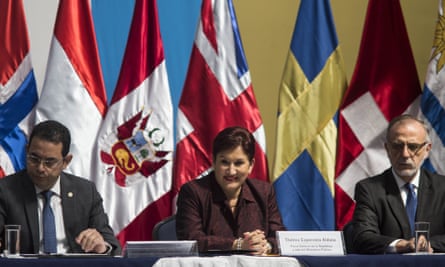It is a crime-fighting force which has toppled presidents accused of corruption, dismantled criminal networks commanded by former army officers, and detained security chiefs who operated death squads.
The International Commission against Impunity in Guatemala (Cicig) has dented the immunity long enjoyed by the country’s criminal rich and powerful, using 21st-century law enforcement techniques such as witness protection, wiretapping and covert operations to expose criminal networks.
The UN-backed force is Latin America’s most successful and popular anti-corruption venture, and is reviled by corrupt officials and criminal networks in Guatemala. It is also currently leading corruption investigations against the country’s president, Jimmy Morales, and his family.
These opponents now have an unlikely ally in Washington DC: the Republican senator Marco Rubio, who last week suspended US aid to Cicig amid claims of Kremlin infiltration.
“This was a stich-up. Rubio changed policy after hearing one side … this is a classic fake news scenario,” said Jo-Marie Burt, Guatemalan expert from the Washington Office on Latin America.
In what appeared to be a separate assault on Cicig, Sweden’s ambassador, Anders Kompass, was last week declared persona non grata and given 30 days to leave the country.
The official justification for the move was that Kompass meddled in domestic affairs by describing Guatemala as a “corrupt society”, but observers said that the real aim was to remove a prominent supporter of Cicig, which Sweden – along with the US and the European Union – has supported financially.
“The most reasonable explanation for demanding ambassador Kompass’s withdrawal is to weaken Sweden’s diplomatic and financial support to Cicig,” the former foreign minister Fernando Carrera told the Guardian. “[Guatemala] has not experienced such international isolation since the worst years of the armed conflict.”
Cicig was created in 2007 to tackle impunity and help dismantle an alliance of criminal networks and clandestine security structures operating as a “corporate mafia state”.

This complex web of economic, political and military elites – and common criminals – infiltrated public institutions following the 1996 peace accords to end the 36-year armed conflict.
Since then, Cicig has helped transform the country’s criminal justice system, resulting in the prosecution of scores of high-impact cases including human and drug trafficking rings, corrupt judges and retired generals accused of masterminding civil war atrocities and criminal syndicates.
Its most high-profile victory was a joint investigation with public prosecutors into a multimillion-dollar customs fraud which in 2015 toppled President Otto Pérez Molina, who is now awaiting trial.
Morales, a former comedian best known as part of a blackface double act, was elected in 2015 pledging support for Cicig while promising he was “neither corrupt nor a thief”.
But since August 2017 prosecutors have made three requests to impeach the president over separate criminal charges. Morales, meanwhile has fronted a broad campaign to weaken Cicig.
He declared the commission’s Colombian chief, Iván Velásquez, persona non grata – an order later ruled unconstitutional – and appointed a new attorney general, María Porras, who has no track record in tackling corruption. When she takes over next week, one of her first decisions will be whether to pursue charges against Morales and his party after the outgoing attorney general and Cicig detailed evidence of illegal campaign funding worth almost $800,000.
Last week’s diplomatic expulsions were a blow for anti-impunity crusaders, still reeling from Rubio’s move to suspend funding.
The Florida senator said that his decision was motivated by the case of a Russian exile family convicted by Cicig on charges of identity fraud.
The Bitkovs were prosecuted as part of a broader investigation into high-level corruption at the immigration office which has so far resulted in more than 40 convictions.
We have placed a hold on CICIG funding to provide time to conduct more oversight over if &/or how this U.N. organization funded by U.S. taxpayers coordinated with sanctioned Russian bank to persecute the Bitkov family https://t.co/3H86XhjgX4
— Marco Rubio (@marcorubio) May 10, 2018
But Rubio, chair of the western hemisphere subcommittee, seized upon the Bitkov case after a Wall Street Journal editorial blamed their lengthy jail sentences (which are under appeal) on Russian interference. Cicig has never received funds from Russia.
Rubio suspended the $6m Senate funding – a third of the annual budget – after a Helsinki Commission hearing which Cicig didn’t attend, and to which no Guatemalan experts were invited.
“Given that Cicig is funded significantly by US taxpayer dollars, Senator Rubio is currently holding $6m while Congress fulfils its oversight role … to ensure [Cicig] is upholding its mandate to fight corruption in Guatemala,” Rubio’s office said.
But the commission did not hear how the whistleblower who triggered the immigration office fraud investigation was murdered in 2010, three months after reporting death threats.
Meanwhile in Guatemala, the murder of three campesino leaders – Luis Arturo Marroquín, José Can Xol and Mateo Chamán Paausince Rubio – within a week has prompted calls to strengthen not weaken crime fighting.
Political analyst Luis Solano said losing US support would be a financial and political blow for Cicig, but also counterproductive to America’s own interests. “It would strengthen ultraconservative groups, and encourage the organized crime structures and parallel power groups to which they are linked.”
